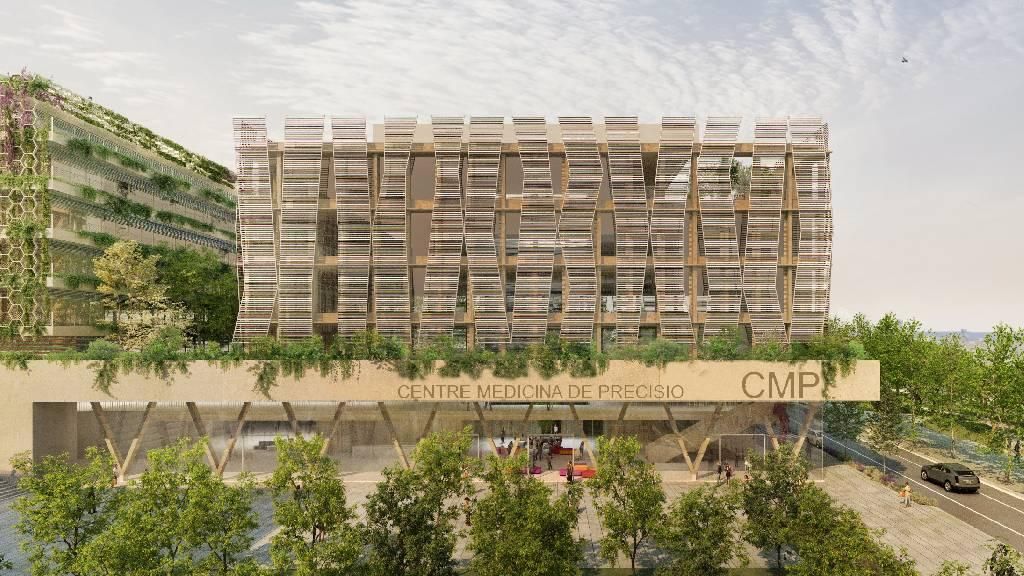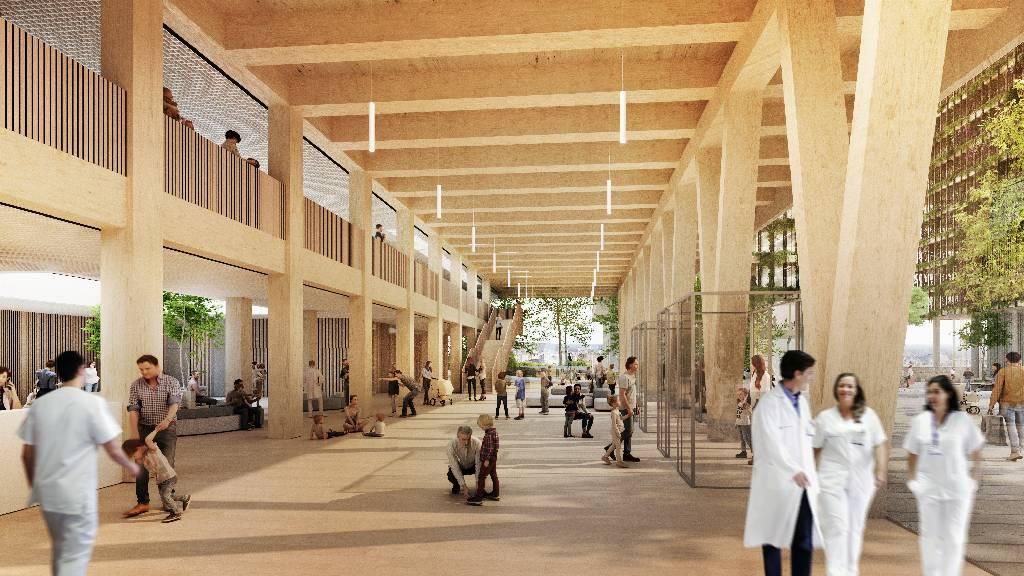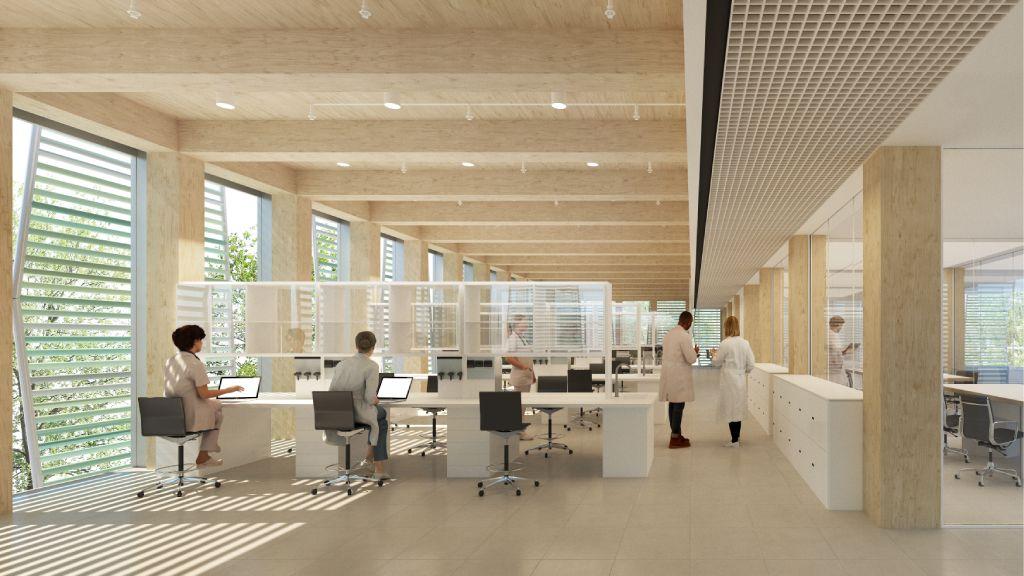Construction work is getting started on Únicas SJD, a monographic centre for the care of and research into rare diseases
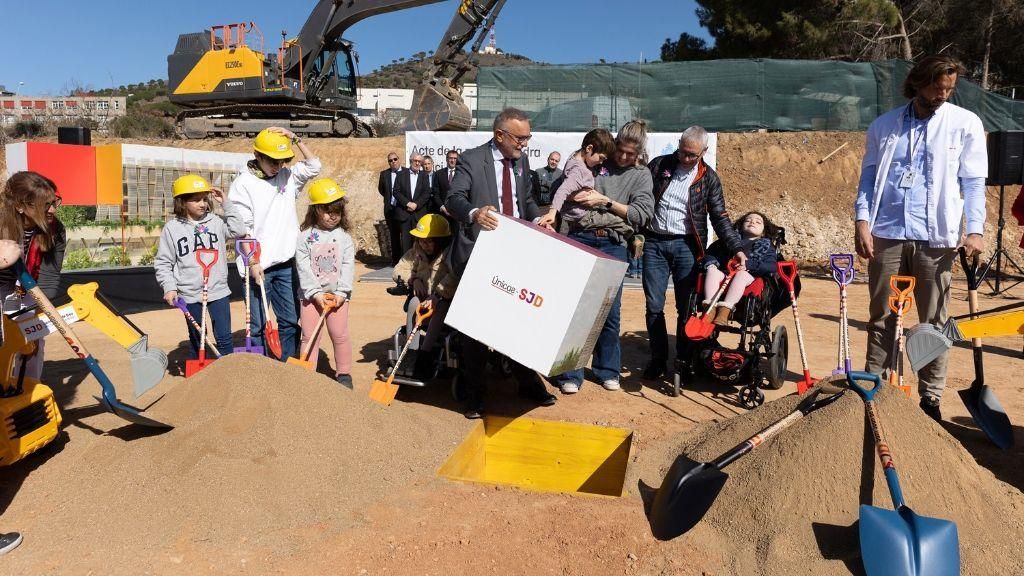
The facility will begin operations at the end of 2025, and alongside the SJD Barcelona Children's Hospital, it will become one of the largest facilities in the world dedicated to rare diseases.
Laying the first stone, the SJD Barcelona Children's Hospital launched the construction works for the large monographic centre for the care of and research into rare diseases, Únicas SJD. When it begins operations at the end of 2025, this building—which will focus all healthcare and research facilities on the diagnosis and treatment of rare genetic and immunological-origin diseases—will become of the three largest complexes in the world dedicated to rare diseases.
The new building is one of the many structures in the ‘Porta Barcelona’ urban project, which will create a biomedical hub in the area to help speed up the implementation of cutting-edge technology in healthcare.
The Únicas SJD building will also be a node in the Únicas Network, an integrated network made up of 30 hospitals across Spain. Launched by the SJD Barcelona Children's Hospital and the Spanish Federation for Rare Diseases (FEDER), this network guarantees that children with rare diseases have access to the best treatments possible, irrespective of where they live.
The Únicas Network is coordinated by the Spanish Ministry of Health and by the various autonomous governments through the Spanish National Health System's Interterritorial Board. Its primary objective is to provide solutions to all of the problems related to these diseases: integration, diagnosis, education, accessibility, data and therapies.
The ceremony to lay the first stone of the future Únicas SJD building involved patients affected by rare diseases and their families, representatives of the various administrative bodies participating in the project and some of the large donors who are helping to finance the building's construction.
An aspiration made reality thanks to the support of the Administration and donations from wider society
Únicas SJD will be brought to life thanks to the support of various public administrative bodies and from donations generously given by wider society.
For more than a decade, philanthropy has been the cornerstone of the SJD Barcelona Children's Hospital's progress in the field of rare diseases. Of particular support, was that of the ‘La Caixa’ Foundation and the Daniel Bravo Andreu Private Foundation: two of our main sponsors in the field of healthcare and research in Catalonia.
The Daniel Bravo Andreu Private Foundation—whose mission is to help build a more patient-centric healthcare system while contributing to the development of biomedical research—has done a huge deal of charitable work in this field, and has always shown their support for children affected by rare diseases.
Likewise, the ‘La Caixa’ Foundation—an organisation that promotes social, cultural, educational and scientific initiatives to help build a society that offers more opportunities to those who most need them—has pledged regular donations over the coming years to help advance research projects into rare diseases, within the framework of the Únicas SJD project. To do so, the SJD Research Institute has been incorporated into their leading research institutions, with ongoing contributions for almost the last 30 years.
Regarding the construction of the facility, the Leo Messi Foundation, the Stavros Niarchos Foundation, Batlleiroig and the Stornoway Group have all pledged to donate funds to help front some of the costs: a total of 42.6 million euros, of which, almost half has already been raised.
The Stavros Niarchos Foundation (SNF) is an international charity which, since 1996, has awarded over 5,000 grants to non-profit organisations in over 130 countries around the world that focus on health, culture, education and social wellbeing. Their contribution to the Únicas project is part of their Global Health Initiative, backed by a billion dollars’ worth of funding, intended to improve the quality of healthcare services and access to them.
Since its inception, the Leo Messi Foundation has shown commitment to the health and wellbeing of the most vulnerable children, backing other emblematic SJD Barcelona Children's Hospital projects such as the SJD Pediatric Cancer Center Barcelona.
With regard to public administration, we have the Esplugues de Llobregat City Council to thank for the site, as well as the Catalan Health Service for financing patient care, and of course, the promotion of the Únicas Network by the Ministry of Health.
We also must highlight the support we have received from patient associations, as well as wonderful community initiatives such as Torró Solidari de Torrons Vicens and RAC1, which have allowed us to carry out various research projects and develop new therapies that will be offered at the new Únicas SJD facility.
A one-of-a-kind facility
The new facility will be built on a plot on Avenida de Ahrensburg, around 250 metres away from the SJD Barcelona Children's Hospital, halfway between Barcelona and Esplugues de Llobregat. The building has been specially designed to convey its service offering from the outside. The main façade will be made up of a series of vertical strips at varying angles—akin to the shape of chromosomes—and the main atrium will consist of several overlapping bands in a spiral pattern, just like the structure of protein chains.
The facility will be 13,877 metres squared and span six floors, housing consultation rooms for the Neuroscience and Genetics departments, various installations for diagnosis of and research into these rare diseases (such as neuromodulation, a genomic studies platform, metabolomics and radiomics), as well as their treatment (neurostimulation and advanced therapies).
The wards have been specially designed so that children with rare diseases can receive care in a single space, with staff from various departments being able to carry out integrated consultations in the one area. This will allow for the consolidation and further promotion of a Hospital initiative from seven years ago that was applied to particular rare diseases, facilitating, on the one hand, easier exchange of knowledge about these diseases between treating specialists, and on the other hand, better work-life balance. The initiative in question, called One Day of Care, has not only managed to reduce the number of days that families are required to come to the Hospital—of particular significance, considering that many families come from all over Spain—but also improve follow-up for these children, reducing admissions, visits to emergency departments and operations.
Únicas SJD will also boast remote care facilities for these patients—a Clinical Command Center, which will allow patients to be monitored remotely, with a geolocalisation system—and a telemedicine service that promotes the exchange of knowledge between treating professionals.
Rendered images of the new Únicas SJD building
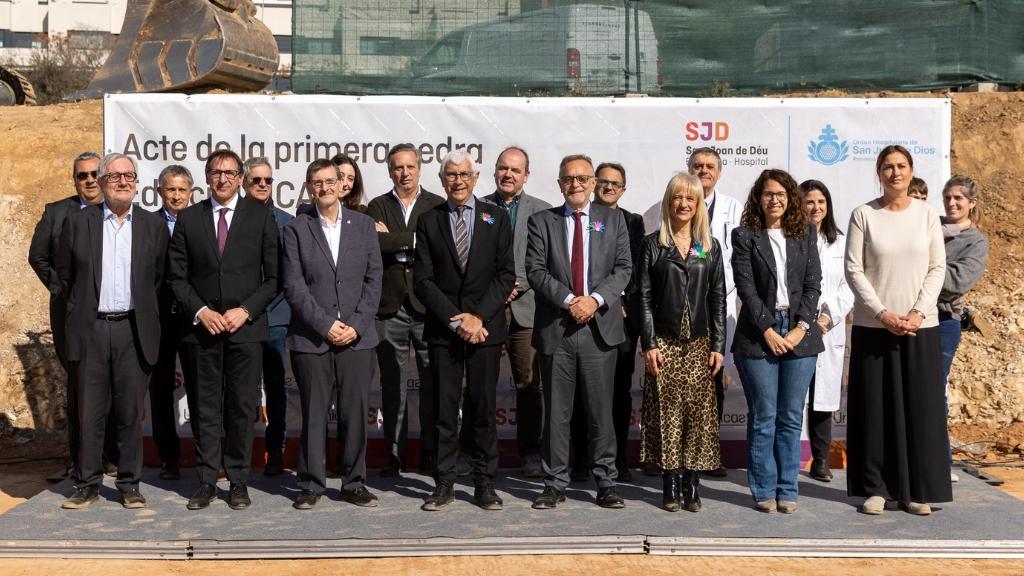
Reference centre for the treatment of rare diseases
The SJD Barcelona Children's Hospital is a reference centre in Spain for its diagnosis and treatment of rare diseases, which, in 80% of cases, are diagnosed in during childhood. In 2005, thanks to collaboration with the Daniel Bravo Andreu Private Foundation, the centre launched the Pediatric Institute of Rare Diseases (IPER) to help further knowledge and research efforts into these statistically uncommon diseases, which, on the whole, still impact a huge number of children. The IPER is kitted out with all of the tools and equipment necessary to facilitate and accelerate diagnosis of these rare diseases, focus on patient care, and further research efforts. At the time, the centre attended more than 10,000 patients with rare diseases. Nowadays, it attends more than 30,000.
In recent years, the SJD Barcelona Children's Hospital has launched various platforms and tools for precision diagnosis—such as the genetic and metabolomic platforms—in addition to launching two new facilities: the SJD Pediatric Cancer Center Barcelona, a monographic centre dedicated to childhood cancer, which is a rare pediatric disease; and La Casa de Sofia, the first intermediary care facility for children and adolescents with chronic diseases in Spain. The lack of space to continue efforts into strengthening healthcare and research on rare diseases is what led the SJD Barcelona Children's Hospital to build this new facility, which will allow them to continue their work in the realm of rare disease and cover a broader spectrum of healthcare needs.
Imágenes renderizadas del edificio Únicas SJD
Centro referente para el tratamiento de las enfermedades minoritarias
El Hospital Sant Joan de Déu Barcelona es referente en España en el diagnóstico y tratamiento de las enfermedades minoritarias que, en el 80 % de los casos, se diagnostican en edad pediátrica. En 2005, y gracias a la colaboración de la Fundació Privada Daniel Bravo, el centro impulsó la creación del Instituto Pediátrico de Enfermedades Raras (IPER) para avanzar en el conocimiento y la investigación de estas patologías muy poco prevalentes, pero que en conjunto afectan a un gran número de niños y niñas. El IPER se dotó de las herramientas necesarias para facilitar y acelerar el diagnóstico de estas patologías, centrar la asistencia en el paciente e impulsar la investigación. En ese momento, el centro atendía a más de 10.000 pacientes con enfermedades raras. En la actualidad sigue a más de 30.000.
En los últimos años, el Hospital Sant Joan de Déu ha puesto en marcha diferentes plataformas y dispositivos para el diagnóstico de precisión -como es el caso de las plataformas de genética y metabolómica- y ha impulsado la creación de dos centros: el SJD Pediatric Cancer Center Barcelona, un centro monográfico para el cáncer infantil, que en el caso de los niños es una enfermedad minoritaria, y La Casa de Sofia, el primer centro de atención intermedia para niños y adolescentes con enfermedades crónicas que existe en España. La falta de espacios para poder seguir potenciando los servicios y estudios dedicados a las patologías minoritarias ha impulsado ahora a los responsables del Hospital Sant Joan de Déu a construir una nueva infraestructura que permita seguir avanzando en el campo de las enfermedades minoritarias y acoja las nuevas necesidades no cubiertas.
Material multimedia para medios de comunicación y de divulgación
El Hospital Sant Joan de Déu Barcelona pone a disposición de los medios de comunicación y de divulgación este material multimedia para completar las informaciones relacionadas con este tema. Este material solo puede utilizarse para la difusión de esta noticia y citando la procedencia de la imagen u otro material en la firma.
